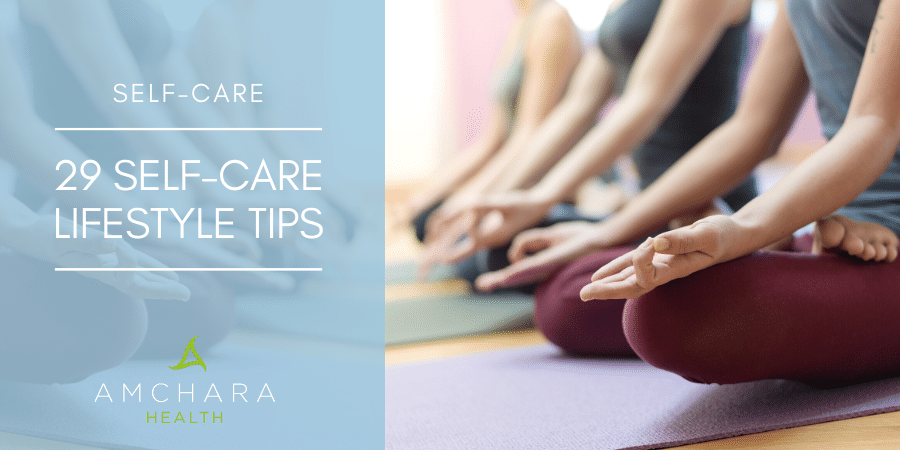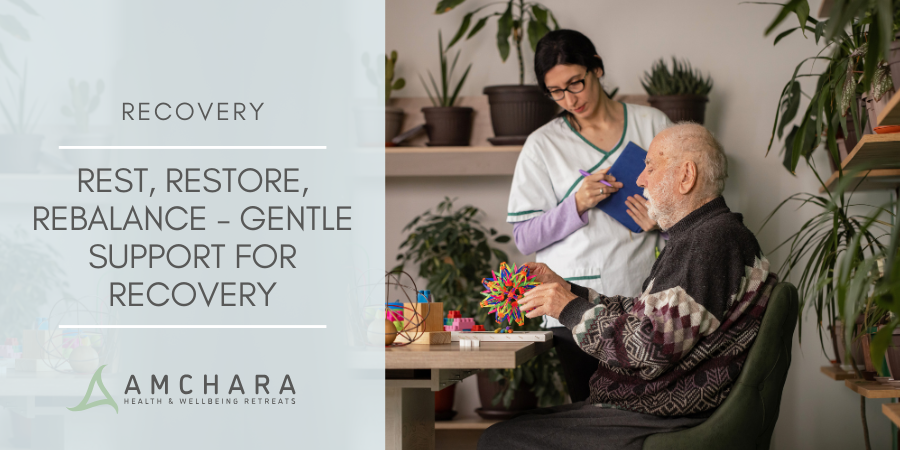Our modern busy lifestyles have led to a change in priorities; activities that were once seen as a necessity are now pushed aside due to perceived lack of time because of juggling work pressures and family life.
The net effect is a society feeling the effects of stress, anxiety, depression and an increase in the incidence of chronic conditions like Type 2 diabetes, obesity, cardiovascular disease and viral infections.
What exactly is self-care and how can you ensure you’re keeping yourself grounded when others around you are stressed? How can you ensure you’re looking after yourself so you can be there for others in times of need?
We’re dedicated to providing you with both insightful information and evidence based content, and in this article we take a look at how you can incorporate more self-care into your life and optimise your health.
What is self-care?
The notion that making positive lifestyle alterations to improve health is far from new, ask any experienced naturopath, Traditional Chinese Medicine practitioner or Ayurvedic practitioner and they will tell you practicing self-care goes back thousands of years.
In the medical world self-care can be defined as ‘a multidimensional, multifaceted process of purposeful engagement in strategies that promote healthy functioning and enhance wellbeing’ (1).
Simply put, this translates to ‘ways to take better care of yourself’. These can involve changes enhancing various aspects of health, including mental, physical, social and emotional health.
Self-compassion is important in self-care. Being kind to yourself and acknowledging you are human and need balance in all aspects of life is a key step to making those important changes.
What happens when self-care is neglected?
Life in the 21st century is dominated with technology allowing an almost 24/7 availability – this may bring a lack of boundaries for work and there may be an expectation for you to be available out of scheduled work hours. Family life may involve both parents working, leaving less time for family obligations. This can affect work life balance and pressures and the strains all add up.
One of the most common reasons cited for not incorporating self-care is a lack of time. Quite simply, self-care is not prioritised due to other commitments.
Health statistics are clearly showing that there is a rise in mental health problems like depression, anxiety and stress. Deaths due to mental health issues have risen over the past few years (2), and three quarters of these deaths involve men.
When it comes to stress, workplace stress is one of the leading factors (3) and has been linked to poor physical health, including muscle and joint aches, as well as poor cardiovascular health.
Obesity, inflammation and Type 2 diabetes are also on the rise, putting a large strain on the healthcare system.
The effects of neglecting self-care are becoming obvious and many physical and mental health conditions may be prevented by incorporating simple self-care techniques.
Why you should incorporate more self-care into your daily life
Self-care isn’t selfish – it is a necessity.
Self-care brings an abundance of benefits and if you wish to achieve optimal health then take a look at what self-care can do for you.
Benefits of self-care:
- Better stress management
- Good quality sleep
- Improved physical health – including healthier blood pressure, better weight management, enhanced immune function and better blood sugar management
- Increased longevity and quality of life
- Reduced ageing
- Improved energy
- Increased productivity and motivation
- Better mental focus and clarity
- Improved self-esteem, confidence and positivity
- Increased compassion – for others and yourself
- Enhanced engagement – feeling more connected with others
- Improved awareness and enjoyment
- Reduced impact on the healthcare system
Where to start with self-care
There are several areas you can consider when looking at self-care, including the following:
- Rebalancing your stress response by supporting the parasympathetic nervous system. This can be achieved through relaxation techniques such as yoga, breathing methods (4), meditation, mindfulness (5), visualisations and affirmations.
- Improving your sleep patterns and circadian rhythm balance – the light dark cycle affects not only sleep patterns but also health. Poor quality sleep is known to lead to increases in stress hormones, insulin resistance (6) and inflammation (7).
- Choosing healthy foods – highly refined white carbohydrates and simple sugars can negatively influence your blood sugar, inflammation and long term health. Opting for whole foods, good quality proteins, oily fish and an abundance of fresh fruit and vegetables can significantly improve health and mental wellbeing. At the same time, addressing your consumption of foods with a negative influence, like alcohol, caffeine, saturated fats and sugar, is also important, as these bring few health benefits.
- Addressing physical activity levels – too little or too much exercise both have negative effects on your body. Again, balance is the keyword. Aiming for exercise to raise your heart rate 3 times a week and adding in resistance exercise with weights twice a week is a good level. High intensity interval training (HIIT), as its name implies, is more intense and a shorter time is needed to see the health benefits which can be useful if your life is very busy.
- Incorporating stillness for the mind and body – if you struggle with a racing mind or an overactive body, you may benefit from being quietened from time to time. Taking time out from thinking or moving can significantly shift thought patterns and reduce rumination, the process of going over and over a thought or problem without coming to a solution. This can greatly improve your mental wellbeing, focus and productivity.
- Social stimulation – human beings benefit from being with others and social isolation brings loneliness, low self-esteem and anxiety. Simply being in contact with others can improve your wellbeing. Face to face contact is better than being connected via social media or online platforms.
Self-care involves identifying where your life needs more balance. For example, if you have a very sedentary but mentally draining job, then balancing this with physical activities like exercise may be of benefit. If, on the other hand, you already have a good level of physical activity alongside a mentally draining job, then a nourishing creative activity or some quiet meditation may balance this.
The key is to identify which changes are of most benefit for you and to make your self-care a routine.
Top self-care suggestions
Once you have identified what areas need more self-care you may want to incorporate some of our top suggestions:
- Embrace nature – also called ecotherapy, spending time in green spaces, gardening, flower arranging or simply growing your own vegetables can enhance your physical and mental health.
- Eat your breakfast or lunch outdoors – take a break and get some daylight alongside nutritious meals.
- Go for a walk in the woods – the Japanese art of forest bathing improves stress levels, mental clarity and physical health.
- Get up at the same time of day every day – this helps to reset your circadian rhythm and improve sleep patterns.
- Go to bed when you feel tired – it sounds simple but denying yourself much needed rest has negative consequences.
- Learn self-massage and practice at least one a week – using uplifting or relaxing essential oils, such as ylang ylang or lavender and geranium, can bring further benefits.
- Perform skin brushing twice a week – gentle sweeping motions towards the heart help with blood flow, lymphatic drainage and can be relaxing after a warm shower or bath.
- Take ten minutes each day to be still and meditate or simply be present and watch your surroundings.
- Step out of a busy day and spend 5-10 minutes just sitting observing – wherever you are stop and look around you, notice what you see, the sounds and smells and be more aware. This increases mindfulness of your surroundings and can be grounding.
- Focus on your breathing when you wake up – take 5-10 minutes after your alarm goes off to pay attention to slow inhalations and long exhalations. This can increase awareness and improve your day from the very start.
- Put aside 10 minutes after work to practice mindful breathing – this can help your mind to unwind after a busy day and reduce stress hormones.
- Make a hot relaxing bath a priority – at least once a week soak away the tension in a hot bath. Add in magnesium flakes or Epsom salts to soothe muscles or aches and pains.
- Learn yoga and incorporate regular sessions – yoga helps to improve flexibility, reduce stress hormones and improve mental wellbeing. Breathing techniques used in yoga can also help to balance your stress response.
- Dance to your favourite song – really let go. If a good song comes on the radio, bring out your best moves! This is sure to make you feel good.
- Listen to your favourite music – rather than just playing it in the background, make a point of choosing music you enjoy and focus on listening. Music can evoke many memories and emotions – a good song can stimulate the release of feel good endorphins that can also relieve pain.
- Spend time with animals – pet therapy can improve your blood pressure, supporting cardiovascular health and enhancing mental wellbeing. Talking to a pet can help with processing thoughts and emotions.
- Set aside time to read a good book – whether it is fiction or fact, reading can be more nourishing for the mind than watching TV or films.
- Seek out laughter – whatever makes you laugh, go in search of it. Laughter is often touted as the best medicine.
- Schedule time with friends – plan ahead and make dates to meet for a cup of tea, dinner, an outing to the cinema or a walk. Don’t allow work or other commitments get in the way.
- Join a new group – be more social and meet new people. This can be paired with finding a new activity such as a creative hobby or exercise group.
- Set 2-3 affirmations to be repeated daily – these will take no longer than 2-3 minutes and can be done out loud or in your mind. Set specific positive affirmations on areas you want to improve. Repeating these affirmations regularly helps cement them in your mind and sets up positive thought patterns.
- Nurture your creative side – knit, sew, scrap book, paint, draw, write, sculpt, there are endless activities to choose from. Being creative can give you a sense of satisfaction and enjoyment, boost your capacity for creative thinking and productivity, as well as help to combat stress levels.
- Ditch draining distractions – the internet and social media can sap your valuable time. Set aside device-free time each day or do a digital detox once a week and avoid devices for a whole day. This can free up time for more self-care activities.
- Revert back to childhood – choose an activity that allows you to behave like a child again. Childhood is far less complicated than adulthood and brings fewer responsibilities. The increase in adult soft play areas goes to show how beneficial and fun it can be.
- Just say no – set boundaries, whether for work or family, and stick to them. Being clear on what others can expect from you can help prevent you taking on too much and having too much expected of you.
- Eat oily fish 2-3 times a week – a good portion of tuna, salmon, mackerel, herring, trout or sardines provides essential omega-3 fatty acids that support cardiovascular health, reduce inflammation and improve mood patterns.
- Stay hydrated – your body needs at least 8 glasses (around 2 litres) of water each day to function efficiently. Even a small amount of dehydration can impact brain functioning. Tea and coffee don’t count as they can increase water loss, so choose herbal tea, rooibos, chicory root ‘coffee’ and fresh water. Make a goal to have a glass of water when you get up and one an hour before bed – that way you are a quarter of the way towards a good daily intake.
- Ask yourself if you are really hungry before you eat – opting for more intuitive eating patterns may prevent automatic or emotional eating and help reduce calorie intake, aid weight management and enable you to make more conscious, healthier food choices.
- Take time out – book a day trip or a weekend away from your normal surroundings and find a fresh perspective – they say a change is as good as a rest. A trip to a health retreat run by expert practitioners can be a useful way to obtain a break and focus on which self-care changes are most beneficial in your circumstances.
Takeaway
Self-care not only involves making changes to support your mental health but also your physical health. Focusing on self-care can help you reach your health goals. Take it step by step and choose a couple of changes to start with, once these become a healthy habit you can start to incorporate more.
If you don’t know where to start and have specific health concerns you wish to address then a one to one consultation with an Amchara Personalised Health practitioner can guide you on the areas where you most need support.
We hope you enjoyed this article.
Did you find it useful?
Have you made self-care changes?
Which ones did you find most beneficial?
We’d love to hear your thoughts, please leave your comments below
Read this next:




